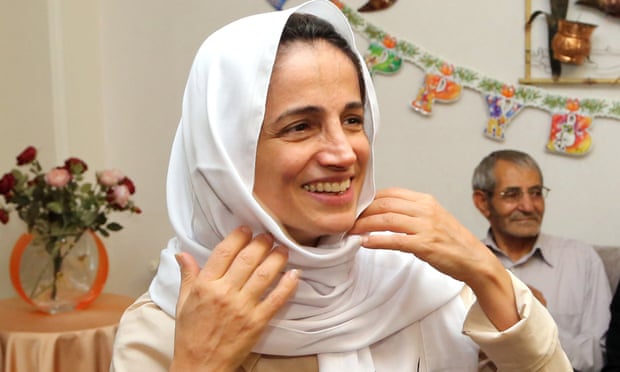Iran arrests lawyer at funeral of girl who died after metro incident
Nasrin Sotoudeh arrested at funeral of Armita Garavand, who died after alleged encounter with morality police, amid reports of police beatings and arrests at cemetery
Iranian authorities have arrested a prominent lawyer and human rights defender as she attended the funeral of a teenage girl who died after a disputed metro incident, her husband has said.
Nasrin Sotoudeh was arrested on Sunday in Tehran during the funeral of 16-year-old Armita Garavand,
who died a day earlier after nearly a month in intensive care.
Sotoudeh, 60, who was awarded the European parliament’s 2012 Sakharov prize for her human rights work,
has been arrested several times in recent years.
“My wife was arrested during the funeral of Armita Garavand along with others,” Reza Khandan, Sotoudeh’s husband, told Agence France-Presse, saying she was “violently beaten” during the arrest.
Journalists attempting to report on the funeral also claimed that Iranian security forces attacked, beat and arrested mourners and protesters who had gathered outside the Behesht-e-Zahra cemetery, where Garavand’s family had gathered to bury their daughter.
“They beat up mourners holding protest placards, I couldn’t get anywhere close to the funeral site,” said Negin*, a Tehran-based journalist, who added that fences had been erected around the cemetery and entrances blocked off. Other journalists who spoke to the Guardian, who all asked to remain anonymous for fear of reprisals, claimed that plain-clothed police officers mingled with crowds outside the cemetery before beating and arresting multiple people.
“I was violently pushed back, and watched as they beat up those holding protest placards. I myself counted at least eight people who were violently beaten and detained. I have no idea where they were taken,” said another journalist who wanted to remain anonymous.
Garavand died after
being taken to Tehran’s Fajr hospital on 1 October after an incident on the metro that left her in a coma, with sharply diverging views over how she was injured. Her death came just over a year after
the death in custody of Mahsa Amini, also a young Iranian Kurd, who was arrested by the “morality police” for allegedly breaching Iran’s strict women’s dress code in an incident that sparked mass protests.
The local Fars news agency said Sotoudeh “had been arrested and handed over to judicial authorities” for “not wearing a headscarf” and “disturbing the society’s mental security”.
Covering the neck and head in public has been compulsory for women since 1983, following Iran’s 1979 Islamic revolution. Women have been increasingly flouting the Islamic republic’s strict dress code since months-long demonstrations erupted in September last year following Amini’s death in custody.
Sotoudeh
was previously imprisoned in 2018 after defending a woman arrested for demonstrating against the compulsory headscarf in Iran. In 2019,
she was sentenced to 12 years in prison on charges of “encouraging corruption and debauchery”.
Garavand’s case was first reported on 3 October by the Kurdish-focused rights group Hengaw, which said she had been critically wounded during an incident on the Tehran metro involving Iran’s “morality police”. Authorities say she suffered a sudden drop in blood pressure and denied that any “physical or verbal altercations” had taken place. Metro surveillance footage, which had been broadcast on state television, showed the unveiled teenager being taken off the carriage after apparently fainting
.
After the funeral,
the Iranian Teacher’s Association released a statement condemning the death of Garavand. It said that Garavand and other young women being targeted under Iran’s hijab laws were “courageous fighters who took a stand against the authoritarian regime’s ideological policies”.
During the public demonstrations last year that followed the death of Amini, schoolgirls became a powerful protest group, with videos going viral on social media of girls in classrooms across the country taking off their hijabs and removing pictures of the founder of the Islamic Republic, Ruhollah Khomeini, from classroom walls.
Human rights groups say that some young women have paid a heavy price for their resistance,
with several high-profile cases of teenage girls dying after alleged encounters with security forces and
the deliberate poisoning of more than 1,200 schoolgirls in cities across Iran this year.
“Armita’s case is one of several in which young girls have paid a heavy price for their defiance,” said the Iranian Teacher’s Association in its statement.
* Name changed to protect identity
https://www.theguardian.com/world/2...of-teenage-girl-who-died-after-metro-incident




